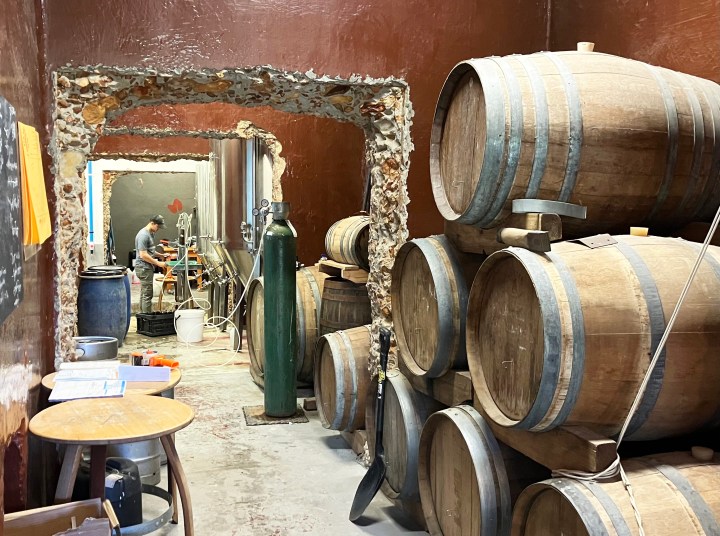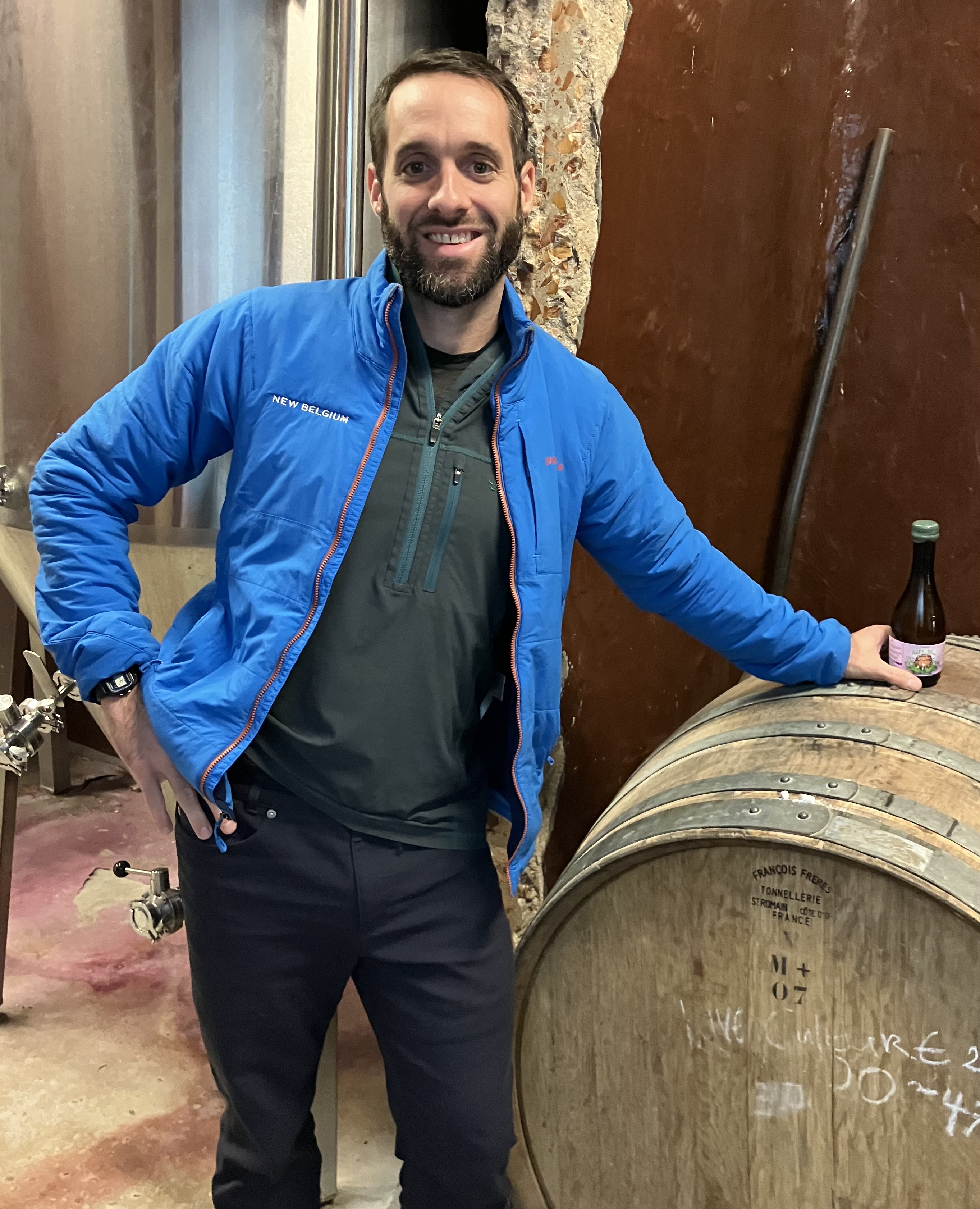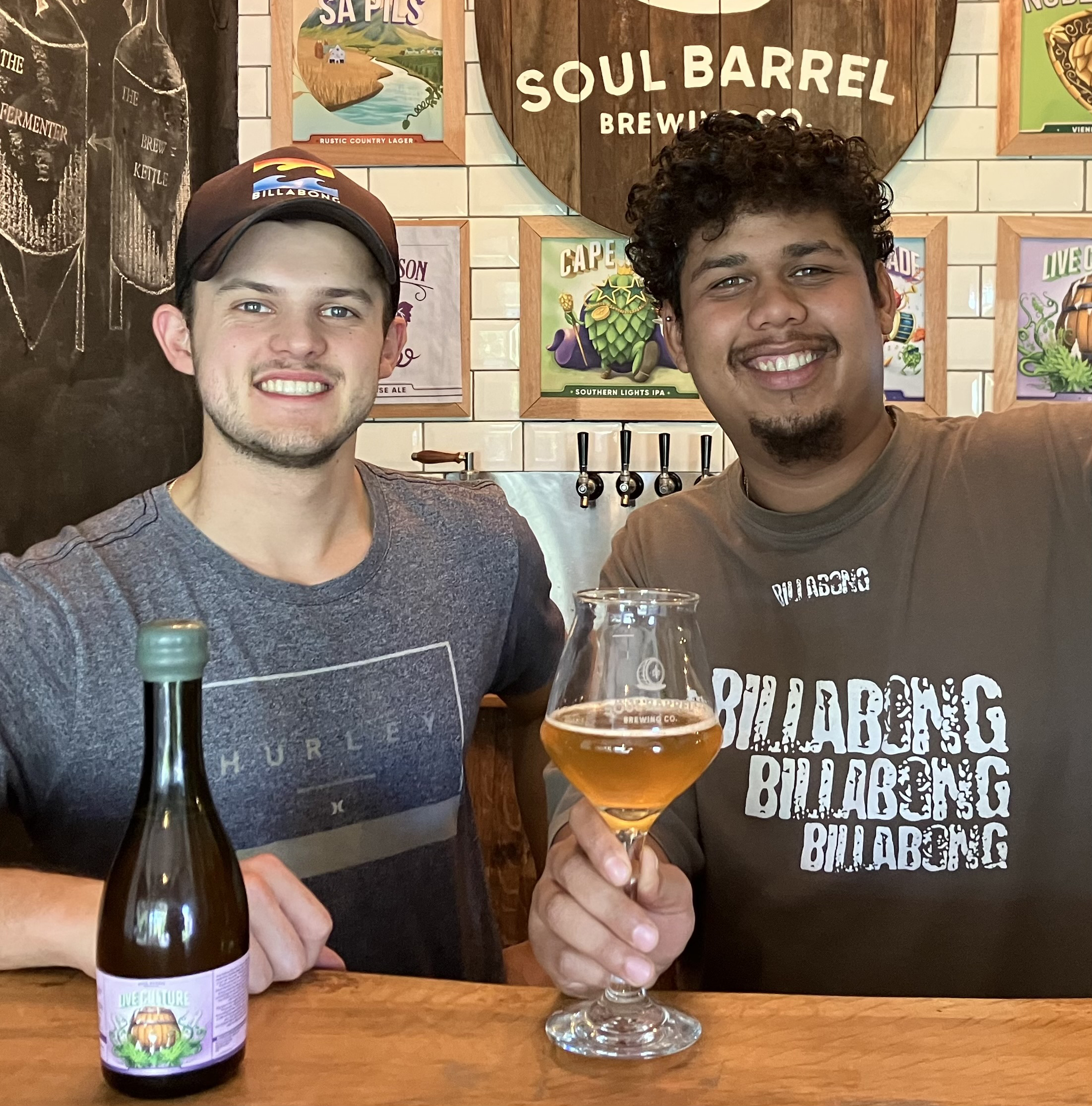GRAND BREW
The thoroughbred craft beer that conquered Africa

Live Grand Cru Culture, a name that deliberately refers to this Winelands craft beer being produced in wine barrels, outperformed the competition in a competitive field of 250 entries from 14 different African countries.
Deep in the heart of the Cape Winelands, just off the R45, sandwiched between Stellenbosch, Franschhoek and Paarl, near the unused Simondium railway station, and on a site where for more than 50 years wine was once produced, lies the home of Soul Barrel Brewing, producers of Live Grand Cru Culture, Africa’s best craft beer in 2022.
Although I live in the region, I was unaware of the existence of the craft brew operation that had been cheekily started in wine country with all its achievements, until my wife, Lianda, and family friend, Siobhan Tregoning, took me to Soul Barrel on my birthday in mid-May.
Not usually a beer drinker, and ignorant about craft beer, I am one of those people who cannot avoid reading, even scraps of newspaper.
Sitting in what was a wine cellar for Drakenstein Cooperative Winery 1906 until the mid 1980s, my eyes stopped on a proud announcement on a solid wall, in which some of the original mason work, including brown river rocks, were exposed. The message was simple: on 14 May the wild-fermented craft beer Live Grand Cru Culture was crowned 2022 champion of Africa at the African Beer Cup. This is an annual continental craft beer competition which was launched three years ago by beer writer Lucy Corne, and is the continent’s biggest beer competition.
Live Grand Cru Culture outperformed the competition in a competitive field of 250 entries from 14 different African countries.
Intrigued, I wanted to know more. However, that birthday outing was not the most opportune moment for me to be curious. So I returned a few days later to talk to the owner Nick Smith, an American from New Orleans in his country’s deep south, who was lured to South Africa by romance and marriage.
As a slight breeze was scattering yellow leaves around and on us, and warmed by the winter sun, we talked about the rains that were expected later in the week and the weekend before moving to the serious subject of craft beer and this year’s continental championships. Craft beer is different from commercial beer, as well as traditional beer, which is made from sorghum.
Bubbling with pride like the parent of a new-born child, Nick was keen to talk about the 18-month process that led to the release of Live Grand Cru Culture last December. One of his first points was that the gold medal-winning craft beer was a South African thoroughbred, with all the ingredients used coming from the Western Cape.

The brewer-in-chief, Nick Smith, the man from America’s deep south who wants to showcase South Africa’s world-class craft beers. Pictured in front of the French oak live culture barrel in which the gold medal-winning Live Culture Grand Cru was brewed. (Photo: Lianda Cruywagen)
In the plant kingdom of the Western Cape, fynbos is king. Nick and his two fellow brewers at this small operation, Devin Hendricks and Kian Bradley, turned to the veld for inspiration and found themselves drawn to wild geranium which is an essential flavouring ingredient.
Said Kian: “We use it because we wanted to highlight our fynbos. We chose wild lemon geranium which gives Grand a slight lemony taste.”
Barley was ordered from Caledon in the Overberg, a picturesque part of the Western Cape known for sheep-farming, canola and grain fields, and rolling green hills.
“To make beer from raw barley it first must be malted. We followed a very traditional process called floor malting. The grain is soaked, then spread out on the floor as it begins to grow. Once the growing seed is fully developed, we then dry it in the sun through a process called kilning and finish it by toasting it in a big pot over a fire. The coffee roaster next door helped us to do this.”

This is Africa’s best craft beer: Live Culture Grand Cru. (Photo: Supplied)
This process creates and extracts sugars from the malt and gives the beer much of its honey colour. It also adds a bit of a biscuity popcorn taste. However, that’s not all that needs to be done. The sugar liquid must still be mixed with hops.
Hops are an essential ingredient. It is grown in the George region, mainly for commercial beer producers. The three brewers tried to grow their own hops.
“It’s more of a wild grown hops. We sowed it a few times. It didn’t take. One day it just grew. Now it grows every season,” recalled Devin.
The hops give the bitterness and also enhance the flavour of the beer. “We add the hops to the boiling process which develops the bittering characteristics that we need for the beer taste. We also later add hops to the fermentation barrels which further extracts more aroma from the hops than just its bitterness – something which helps to complement the fynbos,” Kian mused.
Before the hops were used, it was also given the sun-drying treatment. “For this beer we used our own malt (hops) and dried it in the sun, like they used to make malt hundreds of years ago. It’s a very traditional process using ingredients on hand like they would have made beer before the industrial revolution,” Nick added.
The craft beer was then brewed in a slow, traditional way and fermented in a French oak wine barrel for a year. In this process, wild yeast entered the picture.
Said Nick: “We didn’t add any traditional yeast to his beer, it was fermented only with wild yeast. Wild yeast typically describes a type of live culture called Brettanomyces, or any other live cultures that live inside the wine barrel and that comes from the environment. It is an unusual process to ferment with wild yeast, especially the way we do it. Our Live Culture barrel which we used specifically for this beer has dozens of different strains of wild yeast that originated from various places and from our environment and ingredients. As the time, ingredients and season change, different wild yeasts will emerge or become more prominent.”
Why the name Grand Cru? “Live Culture is a family of beers. This one we called Grand Cru because it was released, like a Grand Cru which is a traditionally premium wine, during the festive season last year. The wine name also speaks to the heritage of the old wine cellar where we are.”
Live Grand Cru Culture is not a commercial [O41] beer, Nick said. “To some extent this beer is unlike any other in the world. It actually more resembles aged champagne. With an eight and a half percent alcohol level, it’s a sipping beer.”
From the first moment they tasted this honey-coloured craft beer, said Nick, they knew they had a winner on their hands. Still they did not expect to be crowned with gold.
“We did not expect to win. One’s beer is like one’s kids, you know. You think they’re all special and great beers. Beer covers a wide range of styles and types of beer. It’s also subjective in a sense. I want balance, structure and inspiration. Things that are interesting to me may or may not be good to someone else. When we released Grand Cru we did think that it was a world-class beer, though. We took a chance with it and it won.”
On the night of May 14, when the winning beer was announced at a function in Cape Town, Nick was at home helping to look after his young boy who was sick. “I was at home with my kid Jack who is three-and-a-half years old. I didn’t know we’d won. I then started to get lots of text messages and realised we’d won.”

Young brewers Kian Bradley, left, and Devin Hendricks who helped to produce Live Culture Grand Cru. (Photo: Lianda Cruywagen)
Kian was watching the event being live streamed. Devin was at the awards ceremony, admitting that like any young guy he just went for the free food and socialising, and was totally taken aback and utterly surprised and overjoyed when the winning beer was announced.
Success in competitions brings in orders. Things at Soul Barrel Brewery have been hectic, a change in fortune that is welcome after the slowdown caused by the country’s Covid lockdown.
“It’s obviously very exciting to win the best beer in Africa award, but most of all I think we’re grateful to our supporters and to our beer community. Our mission at Soul Barrel is to showcase South African ingredients and prove that locally made beer can compete with any in the world. We feel like winning this award with a 100% South African beer is a step toward achieving that goal,” Nick said.
He is proud of his two young colleagues. “Devin and Kian are local talents. Devin is from Paarl and Kian is from Durbanville. Devin started with us about two years ago with only tasting room experience and has worked hard and has turned into a strong brewer.
Kian started with us in September as an intern and has also worked hard and accomplished a lot in a short time.”
The three brewers have one common goal: to create life-changing experiences. “We want to showcase local ingredients. We don’t want to make the same beers you can get in Europe or the States. We wanted to make a specific South African beer that is unlike any other beer in the world.”
Why the name Soul Barrel Brewery? “We want to highlight the barrelling and ageing. It’s unique to us. Soul is to put meaning into something. For us it’s brewing with a purpose, brewing with meanings. It’s like soul music,” Nick said.
To be the brewer of craft beer, said Nick, requires a combination of practical experience, skill and education. “Most people don’t realise there is lots of science involved. On top of that is also the artistic side, flavour tasting, and understanding where you want to go. It’s like a craft: a blend of arts and science.”
Blend it well and a champion craft beer emerges. DM/TGIFood
Soul Barrel Brewing, Simondium, Franschhoek.
Dennis Cruywagen is an author and former ANC spokesperson in various capacities.





 Become an Insider
Become an Insider
Comments - Please login in order to comment.